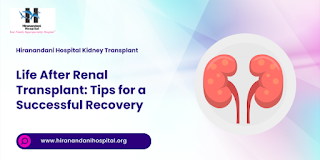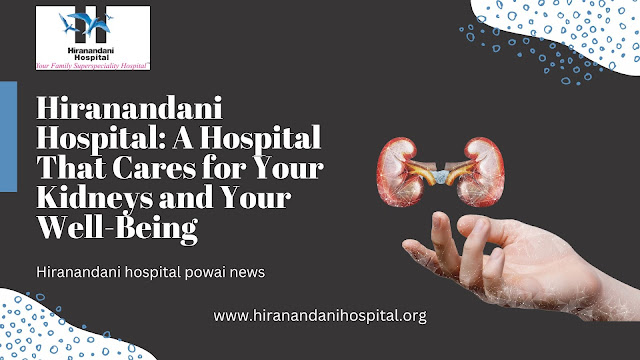Life After Renal Transplant: Tips for a Successful Recovery
a. Rest and Recovery: After a kidney
transplant, your body needs time to heal and adapt to the new organ says doctors
of Hiranandani
Hospital Kidney transplant. Ensure you get plenty of rest and avoid
strenuous activities for the first few weeks following surgery. Listen to your
body and do not push yourself beyond your limits.
b. Avoid Infection Risks: As you will be on immunosuppressive medications to prevent organ rejection, your immune system will be weaker. Protect yourself from infections by practicing good hand hygiene, avoiding crowded places, and wearing a mask when necessary. It's essential to maintain a clean and healthy living environment.
c. Smoking and Alcohol: Both smoking and excessive alcohol consumption can negatively impact your new kidney and overall health. If you were a smoker before the transplant, it's crucial to quit smoking entirely. Limit alcohol intake, and if possible, eliminate it altogether.
d. Stress Management: Coping with stress positively is crucial for your overall well-being. Chronic stress can have adverse effects on your health, including your immune system. Engage in relaxation techniques, meditation, or hobbies that bring you joy and help reduce stress levels.
Medication Management:
a. Follow Prescribed Medications: Taking all
prescribed medications on time is vital for maintaining the health of your
transplanted kidney. Immunosuppressive medications are critical to prevent
organ rejection. Do not skip doses or stop medications without consulting your
healthcare team.
b. Immunosuppressants: Immunosuppressive medications weaken your immune system to prevent it from attacking the transplanted kidney. These medications require careful monitoring and management. Report any side effects or concerns to your transplant team promptly.
c. Monitor Blood Pressure: High blood pressure can impact kidney function. Regularly monitor your blood pressure at home and attend follow-up appointments with your doctor to ensure it stays within a healthy range. If needed, take prescribed medications to manage hypertension effectively.
Dietary Recommendations:
a. Stay Hydrated: Staying well-hydrated is
essential for kidney function. Drink plenty of water, but be mindful not to
overhydrate, as excessive fluid intake can strain the kidneys.
b. Balanced Diet: Follow a well-balanced diet that includes a variety of fruits, vegetables, whole grains, lean proteins, and limited amounts of salt and saturated fats. A balanced diet will provide essential nutrients for healing and support your overall health.
c. Limit Sodium Intake: Reducing sodium (salt) intake can help manage blood pressure and minimize fluid retention. Avoid adding extra salt to your meals and read food labels to choose low-sodium options.
d. Control Potassium and Phosphorus: Depending on your kidney function and medication regimen, you may need to monitor and control your potassium and phosphorus intake. High levels of these minerals can be harmful to your kidneys. Work with your healthcare team to develop a dietary plan tailored to your needs.
a. Gradual Exercise: Regular physical activity
is essential for overall health, but after a kidney transplant, it's essential
to start with light exercises and gradually increase activity levels. Walking
and swimming are excellent low-impact options to begin with.
b. Avoid Overexertion: Be cautious not to overdo physical activities, especially in the initial stages of recovery. Allow your body to adjust and gain strength gradually.
c. Consult Your Doctor: Before starting any new exercise routine, consult with your transplant team, including Dr. Sujit Chatterjee, to ensure it is safe for you. They will guide you on the appropriate level of activity suitable for your specific situation.
Recovery after a renal transplant at Hiranandani Hospital Powai news, led by Dr. Sujit Chatterjee, requires attention to various aspects of life to ensure the best possible outcomes. By following the detailed guidelines on lifestyle adjustments, medication management, dietary recommendations, and exercise provided in this blog, you can promote a smooth and successful recovery while safeguarding your new kidney's health.
Remember, your healthcare team is your best resource for support and guidance during this journey. Regular follow-up visits and open communication with your medical team will help you achieve a brighter and healthier future with your transplanted kidney. Embrace this new chapter in your life with optimism and confidence, knowing that you have received the best care from a team of dedicated professionals at Hiranandani Hospital Kidney Transplant Center. Here's to your improved health and a fulfilling life ahead!



Comments
Post a Comment